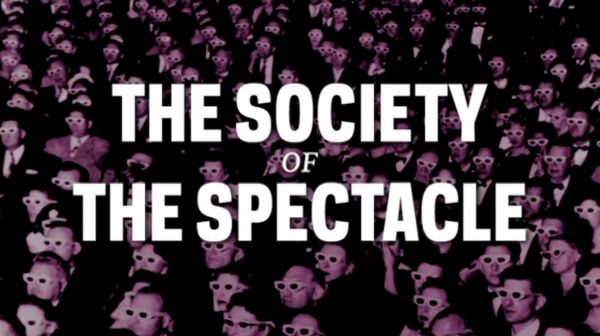Trying to actually define The Situationists is a slippery business. The more people who weigh in on what they were about, the more confusing it becomes. As an official art movement, Situationism existed from 1957 to 1972. They are considered a missing link between Dada and Surrealism, and conceptual art. Most of the people who went to art school and started bands in the 1970s studied them at some point. The most famous text to emerge from their manifestos is Guy Debord’s 1967 book: The Society of the Spectacle. Many of the themes of the book are still very relevant to the current conversation. These include the degradation of human life, mass media promoting commodity fetishes, and the connection between religion and marketing. Among the generation of artists currently working The Yes Men, The Art Guys, AdBusters, and Banksy have all been cited as possessing Situationist DNA.
In 1973 Debord released a film using Detournement (a term invented by Debord, that is variously translated as appropriation or hijacking) of found footage that was billed as a film of his book by the same title: The Society of the Spectacle. This had enough showings in art venues to become the stuff of legend by the time Debord withdrew his films from circulation in 1984. After his suicide in 1994, his widow began in earnest to promote his legacy. She even managed to get a boxed set of his films released in 2005. Although there has never been a version officially released with English subtitles, museum screenings started to cause English subtitled copies to find their way into the VHS bootleg market, by the late 1990s. Digital screenings eventually caused high quality DVD bootlegs to emerge. One of these has appeared on YouTube. (Should this one vanish, Ubuweb is hosting officially sanctioned online versions now too.)
This is not an easy film to watch, and it is not meant to be. The editing style owes much to Eisenstein, and the source material is a dense collage of Hollywood films, Soviet films, industrial and commercial films, and imagery from high end lifestyle magazines. These are mingled with footage of Lee Harvey Oswald’s murder, the Spanish Civil War, the 1956 Hungarian Revolution, and the Paris riots of 1968. While these montages are flashing, a voice reads quotes from Karl Marx, Machiavelli, de Tocqueville and assorted revolutionary manifestos. As images fly by at a pace that must have dizzied pre-MTV viewers, Debord added an extra layer of confusion by subtitling the quotes in French (which don’t match the spoken text). The version that is available online often floats English subtitles over the original French ones, so it is hard to know if the English subtitles are translations of the spoken text or of the embedded French subtitles. Either way, the visual and audio information makes an effort to be difficult to comprehend. The fact that four decades later, the layers of information are no less oblique and confusing, is testament to what a ground breaking assemblage this whole thing is.


